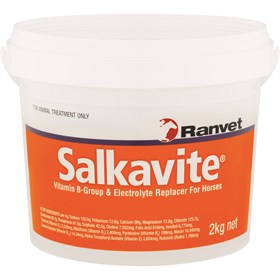
A horse should consume 35 - 40L of water per day
Written by Ranvet
The horse’s body is made up of 60% water. Not only is water vital for life, it also provides your horse with “Cool Energy”, brightness in their coat, and general health and wellbeing.
We all know the famous saying “You can lead a horse to water, but you can’t make them drink”, but what people might not know is that there are actually biological reasons your horses does not drink when it is dehydrated.
When a horse’s body goes into a state of 10% dehydration with low salt concentrations the horse’s survival mechanisms will take over, telling them not to drink. When this occurs the only way to trigger the thirst reflex is to provide a concentrated dose of salt and electrolytes. Electrolyte supplementation will aid in maintaining fluid balance and hydration, while also promoting fluid intake.
In order to remove heat, horses produce large volumes of sweat which aids cooling by evaporative loss from the skin surface. During high intensity exercise, this process is exaggerated and may result in increases in sweating rates by up to 15 litres per hour. Excess sweat loss is a major contributor to dehydration and highlights the importance of knowing the clinical signs.
What are the clinical signs of dehydration?
· Muscle fatigue, stiffness and soreness
· Tying up
· High heart and respiratory rates
· Poor capillary refill
· Sunken eyes and dry mucous membranes due to insufficient body fluid levels
· Poor Performance
What are the Risk Factors of Dehydration?
· Muscle fatigue, stiffness and soreness
· Tying up
· Colic
· Shock
· In extreme cases: Death
How can you prevent dehydration?
1. Always ensure your horses has access to fresh, clean water
2. Feed plenty of roughage
3. Dampen hay
4. Feed high water content feeds such as Speedi-beet
5. Feed salt daily
6. Provide an electrolyte supplement daily or every time your horse sweats.
Did you know? Your horse should be consuming 35-40L (2 buckets) of water each day.
What can you do to ensure optimal electrolyte provision?
Adequate electrolyte supplementation plays a valuable role in preventing metabolic distress and is a key factor in horse rations ranging from maintenance to elite performance.
· Supplementing electrolytes to rations daily is optimal. Ideally, electrolyte provision should be divided between morning and afternoon feeds to ensure greater utilisation of electrolytes. Daily supplementation of Salkavite is ideal for maintaining electrolyte levels while also ensuring optimal provision of B-Group vitamins for the maintenance of appetite and efficient energy metabolism.
· Administer electrolytes according to exercise intensity and sweat loss. The hotter and more humid the climate, the greater amount of electrolyte to be supplied.
· Ensure provision of electrolytes while traveling to prevent dehydration and heat stress. Supplements such as Electro Paste are ideal for traveling as they are administered over the tongue via a pre-dosed syringe or added to drinking water
· Ensure electrolyte supplementation before and after exercise. It is necessary to hydrate horses prior to exercise to ensure optimal performance but also important to rehydrate after exercise to stimulate the thirst mechanism to encourage drinking and a speedy recovery
· Ensure constant access to fresh, clean drinking water before and after exercise
Daily supplementation of Salkavite is ideal for maintaining electrolyte levels while also ensuring optimal provision of B-Group vitamins
© Ranvet
Take Home Message: When considering your horses dietary needs remember, Water is always No. 1
https://www.equestrianlife.com.au/articles/Why-water-is-the-most-important-nutrient


